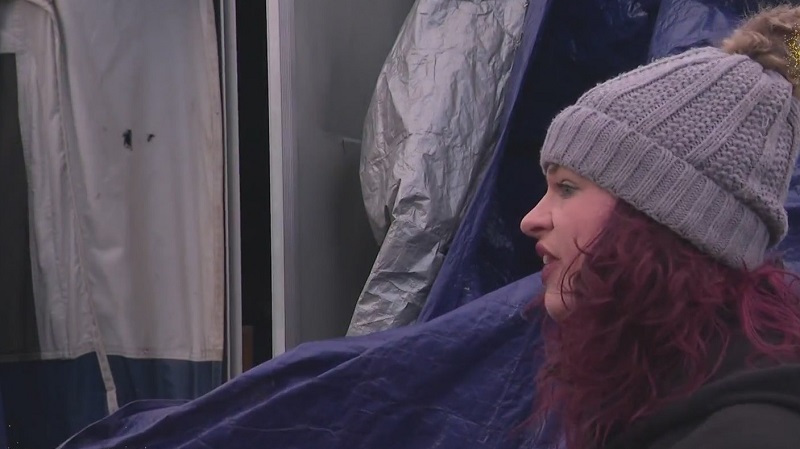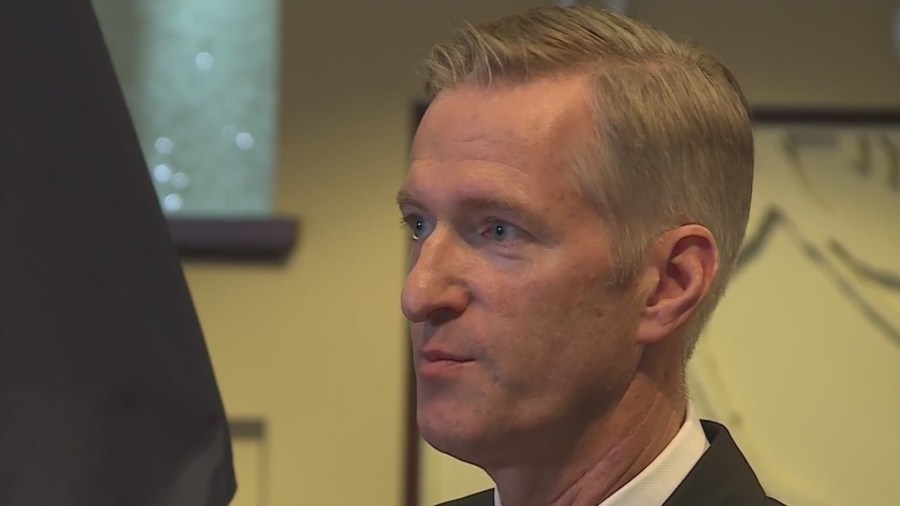PORTLAND, Ore. (KOIN) — In an area of San Diego known as the Triangle District, it’s Cash For Trash Day twice a week. On Mondays and Thursdays, homeless people are provided with trash bags, then they bring their garbage to a giant Dumpster. In exchange, they are paid $2 for each bag of trash.
“It’s a program to address the street cleanliness,” said Drew Moser, the executive director of the Lucky Duck Foundation. “Our mission is to alleviate the suffering of homelessness throughout San Diego County. This is just one pilot program of a whole host of programs we fund.”
The Lucky Duck Foundation was started by philanthropist — and former University of Oregon Athletic Director — Pat Kilkenny. The foundation funds emergency transition shelters and other homeless programs. The Cash for Trash program is one of those programs.
“This is a chance to give people an opportunity to alleviate their suffering by being able to clean up their surroundings and contribute to the overall street cleanliness,” Moser said.
Cash for Trash began in March. So far it’s been a huge success. In its first 26 days of operation, almost 30 tons of trash was removed from the streets by the homeless themselves. There’s an average of 1.5 tons of garbage each morning the Dumpster arrives.
“The interest and response has been really, really positive from people suffering on the streets, community members, business owners who are seeing the significantly improved and cleaned up conditions,” Moser said. “We are very pleased with these early results.”
Over the past 6 months KOIN 6 News has documented the homeless and trash problem in Portland, especially along SE 94th and Pardee. After every organized cleanup the homeless return along — as do mountains of trash and garbage.

In February, homeless campers Will and Ashley spoke with KOIN 6 News. They live in a tarp-covered trailer on the street. Will said he hates the garbage and would welcome a program like Cash for Trash.
“Yeah, that would be a good idea,” Will said. “They don’t even have to pay us to as long as they, like, give us trash bags, they give us a number to call as they’re giving us the bags. And once you have enough trash bags someone could come pick it up.”
People living on the streets do find ways to get money. KOIN 6 News saw one homeless man in downtown Portland dumping out a case of bottled water purchased with an EBT card to earn a few dollars by recycling the empty bottles.
It’s one reason why San Diego’s Cash for Trash program makes sense — involve the homeless as part of the solution.
“There’s nothing perfect in homelessness,” Moser said. “There is best in class and if something is 80% to 90% solid or a good idea, we need to act on that idea.”

When it comes to cleaning up the city, Portland has struggled to cut through the red tape and bureaucracy. Different agencies and bureaus finger point over who is responsible.
Frustrated neighbors and group Adopt One Block recently banded together to clean up property owned by ODOT.
“We’re paying taxes and they are awash in money,” said Frank Moscow of Adopt One Block. “This is the land they are the responsible party for getting and keeping it clean. We are tired of excuses. This has been going on for years.”
In his State of the City address earlier this month, Mayor Ted Wheeler announced a new emergency declaration to cut through the bureaucracy that has led to a lack of urgency and accountability in Portland’s recovery efforts.
“This is just common sense,” Wheeler said that day. “It puts one centralized structure over 20 city programs and 8 bureaus currently led by 5 different City Council members.”
He also mentioned the KOIN 6 News series of stories spotlighting the problems Portland is facing.

“Last week KOIN answered their own question,” Wheeler said, “stating, ‘Is Portland over? No. But there’s a lot of work to do.’ I wholeheartedly agree.”
Portlanders can’t solely rely on City Hall. Budgets and well-intentioned plans, as well as mayors and city council members, come and go. Portland isn’t San Diego. But the city might learn from how the Lucky Duck Foundation is confronting homeless problems — involving local businesses and community leaders who are committed to taking action, finding solutions and holding policy leaders accountable.
The Lucky Duck Foundation “has really agreed to sign on for life that this is going to be their philanthropic endeavor. And a part of that committment is agreeing to survive generations of politicians to collaborate with them but also hold them accountable,” Moser said.
“We do not care about credit. We care only about results. We’ll be the first ones to pat them on the back if they take a legitimate step forward and practical action steps. But if the effort is lacking, the pat is going to be lower and harder, and we’re not afraid to confront them or hold their feet to the fire to do more proactive steps, immediate steps, to immediately help those suffering on the streets in their homelessness.”
How you can help
One way to contribute and help with cleaning up Portland is to get involved with SOLVE.
SOLVE has now expanded their volunteer efforts to focus on areas in and around homeless camps, working with volunteers to clean up these areas. This is in addition to their regular cleanups of downtown Portland.
SOLVE has been Portland’s example of how an organized effort of volunteers can make a real difference in returning Portland to the kind of place it can be.
Get involved with SOLVE
Other ways to get involved: